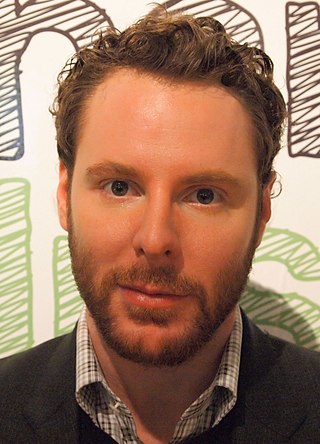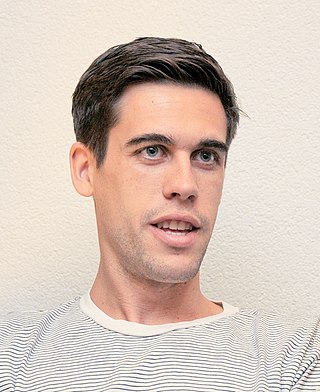Related Research Articles
Stephen Randall Glass is an American former journalist and current paralegal. He worked for The New Republic from 1995 to 1998 until it was revealed many of his published articles were fabrications. An internal investigation by The New Republic determined the majority of stories he wrote either contained false information or were fictitious. Glass wrote a fictionalized account of his story in the 2003 novel The Fabulist, and the scandal was dramatized in the film Shattered Glass, which was based on a Vanity Fair article of the same name and starred Hayden Christensen as Glass.
Viral marketing is a business strategy that uses existing social networks to promote a product mainly on various social media platforms. Its name refers to how consumers spread information about a product with other people, much in the same way that a virus spreads from one person to another. It can be delivered by word of mouth, or enhanced by the network effects of the Internet and mobile networks.

Shattered Glass is a 2003 biographical drama film about journalist Stephen Glass and his scandal at The New Republic. Written and directed by Billy Ray in his feature directorial debut, the film is based on a 1998 Vanity Fair article of the same name by H. G. Bissinger and chronicles Glass's fall from grace when his stories were discovered to be fabricated. It stars Hayden Christensen as Glass, alongside Peter Sarsgaard, Chloë Sevigny, and Steve Zahn.
Charles "Chuck" Lane is an American journalist and editor who is an editorial writer for The Washington Post and a regular guest on the Fox News Channel. He was the editor of The New Republic from 1997 to 1999. During his tenure, Lane oversaw the work of Stephen Glass, a staff reporter who fabricated portions of all or some of the 41 articles he had written for the magazine, in one of the largest fabrication scandals of contemporary American journalism. After leaving the New Republic, Lane went to work for the Post, where, from 2000 to 2007, he covered the Supreme Court of the United States and issues related to the criminal justice system and judicial matters. He has since joined the newspaper's editorial page.

Sean Parker is an American entrepreneur and philanthropist, most notable for co-founding the file-sharing computer service Napster, and serving as the first president of the social networking website Facebook. He also co-founded Plaxo, Causes, Airtime.com, and Brigade, an online platform for civic engagement. He is the founder and chairman of the Parker Foundation, which focuses on life sciences, global public health, and civic engagement. On the Forbes 2022 list of the world's billionaires, he was ranked No. 1,096 with a net worth of US$2.8 billion.
Emerson James Spartz is the founder of the viral media company Dose and the founder of MuggleNet, a Harry Potter fansite.
Michael Noer is an American business writer and editor who has worked for Forbes magazine and Wired Magazine, and is currently the executive news editor for Forbes.com.

Thomas Anderson is an American technology entrepreneur and co-founder of the social networking website Myspace, which he founded in 2003 with Chris DeWolfe. He was later president of Myspace and a strategic adviser for the company. Anderson is popularly known as "Tom from Myspace", "Myspace Tom" or "My friend, Tom" because he would automatically be assigned as the first "friend" of new Myspace users upon the creation of their profiles.

Sarah Ruth Lacy is an American technology journalist and author.

Rick Goings is Chairman Emeritus of Tupperware Brands. He served as a petty officer in the United States Navy during the Vietnam era. Following this, he founded the fire detector distributor Dynamics, Inc. After his sale of the company, he worked in various positions with Avon, including president of Avon USA. In 1992 he joined Tupperware Worldwide as the CEO.
William Troy Landreth is an American hacker notable for his cracking activities during the early 1980s within a cracking club called "The Inner Circle". MySpace cofounder, Tom Anderson was an associate. In 1984, Landreth was convicted of hacking computer systems, and accessing NASA and Department of Defense computer data. In 1986, he disappeared. Landreth's and Howard Rheingold's book, Out of the Inner Circle: A Hacker's Guide to Computer Security, published in 1986, is considered a best-seller.

Ryan Holiday is an American author, modern Stoic, public-relations strategist, owner of the Painted Porch Bookshop, and host of the podcast The Daily Stoic. Prior to becoming an author, he served as the former director of marketing and eventually an advisor for American Apparel. Holiday's debut to writing was in 2012, when he published Trust Me, I'm Lying. Holiday's notable works include his books on Stoic philosophy, such as The Obstacle Is the Way, Ego is the Enemy, Stillness is the Key, Courage is Calling, and Lives of the Stoics.

Take This Lollipop is a 2011 interactive horror short film and Facebook app written and directed by Jason Zada. Developer Jason Nickel used Facebook Connect to bring viewers themselves into the film, through use of pictures and messages from their own Facebook profiles. Starring actor Bill Oberst Jr. as 'The Facebook Stalker', the film acts to personalize and underscore the dangers inherent in posting too much personal information about oneself on the internet. The information gathered from a viewer's Facebook profile by the film's app is used once and then deleted. The title is derived from the 1963 song "Please Little Girl Take This Lollipop", written and performed by singer-songwriter Bobby Jameson, which is used in the film.

Kevin Systrom is an American computer programmer and entrepreneur. He co-founded Instagram, the world's largest photo sharing website, along with Mike Krieger.
Growth hacking is a subfield of marketing focused on the rapid growth of a company. It is referred to as both a process and a set of cross-disciplinary (digital) skills. The goal is to regularly conduct experiments, which can include A/B testing, that will lead to improving the customer journey, and replicate and scale the ideas that work and modify or abandon the ones that do not, before investing a lot of resources. It started in relation to early-stage startups that need rapid growth within a short time on tight budgets, and also reached bigger corporate companies.
Secret was an iOS and Android app service that allowed people to share messages anonymously within their circle of friends, friends of friends, and publicly. It differs from other anonymous sharing apps such as PostSecret, Whisper, and Yik Yak in that it was intended for sharing primarily with friends, potentially making it more interesting and addictive for people reading the updates. It was founded by David Byttow, the former lead for Square Wallet, and Chrys Bader-Wechseler, a former Google product manager at Google+, Photovine and YouTube. Bader-Wechseler left the company in January 2015, with the stated reason that the company's shift away from beautiful design and towards more minimalistic design meant that he felt he was no longer the best person to be at the helm of the company. Byttow announced the shutdown of the app and the company on April 29, 2015.
Social journalism is a media model consisting of a hybrid of professional journalism, contributor and reader content. The format relies on community involvement, audience engagement, social newsgathering and verification, data and analytics, and relationship-building. Social journalism takes place on some open publishing platforms, like Twitter and WordPress.com, but can also involve professional journalists, who created and/or screen the content. CNN's now-defunct iReport was an example of a social journalism collaboration between professionals and citizens; other examples include Forbes.com, infoStraight.com, Medium, BuzzFeed, Soapbox and Gawker. The model, which in some instances has generated monthly audiences in the tens of millions, has been discussed as one way for professional journalism to thrive despite a marked decline in the audience for traditional journalism.
Damn Daniel is a 2016 viral video. Daniel Lara and Joshua Holz, students at Poly High School in Riverside, California, reached Internet fame after Holz's video, an edited collection of Snapchat videos, became popular on Vine, YouTube and Facebook. In March 2016 Time magazine listed Lara and Holz as two of "The 30 Most Influential People on the Internet".
Fake news websites are websites on the Internet that deliberately publish fake news—hoaxes, propaganda, and disinformation purporting to be real news—often using social media to drive web traffic and amplify their effect. Unlike news satire, fake news websites deliberately seek to be perceived as legitimate and taken at face value, often for financial or political gain. Such sites have promoted political falsehoods in India, Germany, Indonesia and the Philippines, Sweden, Mexico, Myanmar, and the United States. Many sites originate in, or are promoted by, Russia, North Macedonia, and Romania, among others. Some media analysts have seen them as a threat to democracy. In 2016, the European Parliament's Committee on Foreign Affairs passed a resolution warning that the Russian government was using "pseudo-news agencies" and Internet trolls as disinformation propaganda to weaken confidence in democratic values.
False news websites in the United States target American audiences by using disinformation to create or inflame controversial topics such as the 2016 election. Most fake news websites target readers by impersonating or pretending to be real news organizations, which can lead to legitimate news organizations further spreading their message. Most notable in the media are the many websites that made completely false claims about political candidates such as Hillary Clinton and Donald Trump, as part of a larger campaign to gain viewers and ad revenue or spread disinformation. Additionally, satire websites have received criticism for not properly notifying readers that they are publishing false or satirical content, since many readers have been duped by seemingly legitimate articles.
References
- 1 2 "Adam L. Penenberg - NYU Journalism".
- ↑ "NFW: Adam Penenberg Joins PandoDaily as Editor". 21 August 2012.
- ↑ Penenberg, Adam L. Lies, damn lies, and fiction. Forbes, May 11, 1998
- ↑ Penenberg, A., Viral Loop: From Facebook to Twitter, How Today's Smartest Businesses Grow Themselves, 2009, Hyperion Press "Viral Loop: From Facebook to Twitter, How Today's Smartest Businesses Grow Themselves"